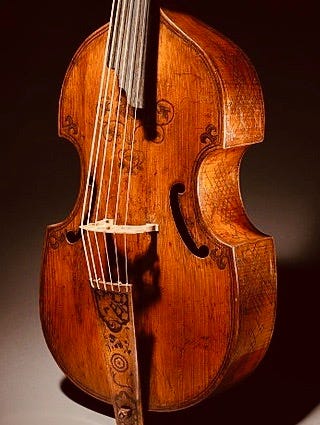Wonderful Word Origins 1
The violin family
Like most classicists, I’m fascinated by word origins and etymologies. Recently I was asked where the word ‘cello’ originates. As usual, the answer takes us down a maze of discoveries about words.
‘Cello’ is short for the Italian ‘violoncello’ (it used to be written ’cello to show that it was an abbreviation). It doesn’t mean ‘cell’ or ‘box’ — which is what I imagined when I started playing the cello aged 10. Italian ‘cella’ means ‘cell’, but has nothing to do with ‘cello’, which is a diminutive ending. ‘Violoncello’ is a diminutive of ‘violone’, so it means ‘a small violone’ (in theory it might have been violonello).
A violone was not a violin, but a large viol (the instrument illustrated above): the Italian suffix -one is augmentative, i.e. it connotes ‘a large version’. So violoncello was ‘a small version of a large viol’! The suffix -ino is another diminutive, so violino, violin, means a ‘small viol’.
But what is the etymological root of ‘viol’ and ‘violin’? The answer is amazing.
The Italian for viol, viola is descended from the Latin word vitula, ‘a calf’. From the leather of the calf were cut strips that became the instrument’s strings! So it was used to refer to a stringed instrument. Vitula also became, as you can hear when the word is spoken, the English ‘fiddle’. It was originally used of the instrument, but the fussy actions of the hands when playing the fiddle led to the sense ‘fidget’. ‘Nero fiddled while Rome burned’ can be read in both senses.
Vitula is also the root of the word ‘veal’ (Italian vitello): the t has dropped out in the same way. Viol, veal. The same happened with ‘roll’, which comes from Latin rotula, ‘little wheel’, a diminutive of rota, the thing that rotates. And ‘pail’, which comes from patella ‘little pot’, which is also the root of Spanish paella.
If music be the food of love, play on.



patella = little dish (from patera), I think; hence the knee-bone, from its shape. More fanciful linguists have also tried to derive 'Italia' from vitula....hmm!
Our oldest son (now 28) began violin lessons at age 4. I thought it was crazy, but his grandmother insisted. I am so very grateful that I relented. His first violin was a 1/32nd size. I still have it. The years of practicing together and going to summer camps together have blessed me richly. And he STILL plays. It is a great consolation to him during times of struggle.
Thank you for sharing your knowledge about the word origins. I have long been fascinated by word origins, ancient languages, and the classics. Our kids’ grandfather was a classicist (May he rest in peace). Only my oldest child was able to meet him. He was a professor at Princeton and other well-known universities over the years. I only knew him for about 4 years before he died, but his knowledge and wisdom definitely influenced me to continue learning.